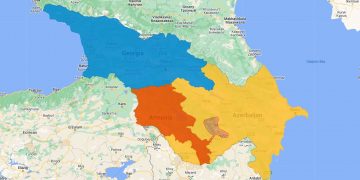Georgia’s bill on agents of foreign influence fueled discussions in the Armenian media about two other similar laws that are in force in the United States and Russia.
Some Armenian media outlets introduced the Georgian bill as one developed under the influence of the American law, others introduced it as a document developed under the influence of the Russian law.
The Fact Investigation Platform examined the relevant laws in both states and the failed bill in Georgia and came up with a brief overview of their similarities and differences.
The US Foreign Agents Registration Act
The Foreign Agents Registration Act (FARA) was enacted in the US back in 1938. Its purpose was to counter Nazi propaganda on the eve of World War II. It recognizes individuals and organizations that engage in political lobbying or advocacy of governments, organizations, or individuals in another country as agents. Those persons or organizations are required to register with the Department of Justice and disclose their contracts with the foreign principals, report the amount and sources of funding. The law defines agents as those who act at the request of or under the direction, control, or order of a foreign principal.
FARA does not prohibit or limit any lobbying activities for the benefit of another country. However, failure to register with the US Department of Justice is a violation of Federal law, and, if the failure is deliberate, the agents may be subject to criminal prosecution.
According to a report by the European Center for Not-for-Profit Law*, the US law does not provide for registration as an agent simply because one receives funds from a foreign source. “Many US NGOs and media organizations receive foreign grants and other support, but the US has not required them to register as foreign agents under FARA. Only about 5% of those registered under FARA are non-profit organizations, mostly branches of foreign political parties,” the report reads.
For many years, the law was in a passive state and rarely became the subject of discussion.
In 2016, it gained relevance again when there were reports of possible Russian interference in the US presidential election. Thus, in 2018, 13 Russian citizens and 3 organizations were charged with violating FARA for interfering in US domestic politics, including the 2016 presidential election. According to the indictment, they concealed their national identities, created social media accounts and posted in support of presidential candidate Donald Trump, criticizing fellow candidate Hillary Clinton. They also coordinated and held political rallies in the United States.
In 2017, the Russian RT agency was recognized as a foreign agent in the United States. Some Chinese, Japanese and South Korean media organizations were also required to register as foreign agents.
The Foreign Agents Registration Act has been criticized from time to time and there have been suggestions that it should be reformed. Many analysts claim that requiring Chinese and Russian news agencies to register as foreign agents, but not requiring Britain’s BBC or Canada’s CBC to do the same, gives the impression that the law is being used as a political tool. Another article we came across noted that the definitions in the law are unclear, which means it could cause problems for civil society, given the fact that the Congress has been trying to tighten the provisions of the law in recent years.
According to an article by the International Center for Not-for-Profit Law, although FARA has traditionally been implemented exclusively in the United States and has significant differences from laws in other countries, its generalized language has made it easy for foreign governments to draw parallels between their laws and US law.
Russian law on foreign agents
In 2012, Vladimir Putin, who assumed the post of president for the 3rd time, signed the law regulating the activities of non-profit organizations that perform the function of foreign agents. The Ministry of Justice created a registry where all organizations that receive funding from abroad and engage in political activities must be registered. Those organizations must also attach information about their status, as well as report on their activities.
In 2017, the Russian Parliament (the State Duma) amended the Law on Mass Media, which allowed for foreign media to be recognized as foreign agents.
According to the amendment adopted in 2019, any individual can be recognized as a foreign agent. The status is given to persons who distribute materials of the media outlets with agent status or receive income from abroad.
In July 2022, Putin signed new amendments to the Foreign Agents Act, which allow anyone who receives support from abroad or is “in other ways under foreign influence” to declare themselves a foreign agent. The only exceptions are employers’ associations, chambers of commerce and industry, and officials of international organizations. According to the law, foreign agents are forbidden to teach in public schools and universities, to carry out creative activities at the expense of the state budget, to participate in procurements under state contracts and to perform environmental assessments. Those NGOs and mass media that do not inform about their status when disseminating their materials are fined 300,000 rubles (about ֏2 million), and in cases of major violations of the law, they can be sentenced to prison.
The Ministry of Justice of Russia updates the list of foreign agents almost every week. Hundreds of individuals and dozens of NGOs and mass media have that status.
In Russia, such well-known mass media as Medusa, TV Rain (before leaving Russia), Alexey Pivovarov’s YouTube channel “Redakciya” and others have been recognized as agents, and former world chess champion, political activist Garry Kasparov, singer Zemfira, comedian Maxim Galkin, journalist Yuri Dudz and others have also been recognized as agents. Later, both Medusa and TV Rain were banned in Russia. It is noteworthy that even those organizations that have nothing to do with politics have received the status of foreign agents in Russia. Among them are “We are Against AIDS” NGO and the World Wildlife Fund (WWF).
Many Russian public figures and lawyers consider the law on foreign agents to be a tool of pressure against civil society in Russia. According to a report by the international Human Rights Watch (2022), the law led a large number of organizations to close because they either sought to avoid the “toxic” label or could not withstand the labeling and heavy fines imposed by the law. The Kremlin used the “foreign agents” law as a legal pretext to shut down other groups as well, such as the human rights group Memorial, one of the 2022 Nobel Peace Prize laureates.
The failed bill on agents of foreign influence in Georgia
On February 14, the “People’s Power” public movement officially announced that it will initiate the Bill on Foreign Influence Transparency. On March 7, the Parliament of Georgia approved the bill in the first reading, after which massive protests began in Tbilisi. The bill was strongly criticized by international human rights organizations, the European Union, the United Nations, the United States and others.
On March 9, the ruling Georgian Dream party announced its decision to withdraw the bill on foreign agents.
While one draft of the law was put to a vote in parliament, another similar draft with tougher provisions was also put up for discussion.
According to the first draft**, agents of foreign influence are non-profit legal entities and media outlets with more than 20% of their income coming from foreign powers. The bill stated that an entity that meets the criteria for an agent of foreign influence must apply to the National Public Registry Agency to register as an agent of foreign influence and submit a financial declaration. In addition, according to the bill, the Ministry of Justice of Georgia had the authority to conduct surveillance at any time to identify an agent of foreign influence or to verify compliance with any of the requirements of the law. The bill provided for administrative liability for non-fulfillment of the relevant requirements (maximum fine was 25,000 GEL, which is about ֏3,750,000).
According to the second draft, the scope of “agents of foreign influence” was expanded to include also individuals and it also had stiffened penalties for non-compliance, from fines to five years in prison. The bill says that a physical individual or a legal person, on the basis of the “interests of foreign force,” would be considered an “agent” of a “foreign power” if they: participate in ongoing political activities in Georgia; act as a public relations adviser, advertising agent, employee of a news service, or political adviser; or finance various organizations in Georgia, lend money or other property, and represent the interests of a foreign power in Georgia in relations with state bodies.
According to Human Rights Watch, many of these vague concepts, including “political activities”, are not clearly defined in the law and could further restrict the right to freedom of association. Although the authorities themselves claim that the prototype of the Georgian bills is the American law, in fact the American law emphasizes the condition of doing political lobbying work, and organizations that are simply financed from abroad are not considered agents.
Thus, foreign influence laws are similar at first glance, but in fact differ not only in individual provisions, but also in the political motivations. The US law was originally enacted to counter Nazi German propaganda, but since 2016 has been actively aimed at reducing Russian influence. Its critics argue that the law has vague and unclear wording, which leaves room for dual interpretation, and in some cases it is selective of countries.
In Russia, the law was adopted immediately after the start of Vladimir Putin’s third presidential term, and according to many analysts and international organizations, it is aimed against civil society. Media outlets and NGOs have been shut down as a result of the implementation of the law.
The formulations in the failed bills in Georgia suggest that they were more intended to be used as a repressive tool against NGOs and the media.
Loosineh Voskanyan
* The report was prepared with the support of the United States Agency for International Development.
** The source of information about the first bill is the Georgian fact-checking website “Fact Meter“.

 FACTOMETER
FACTOMETER









